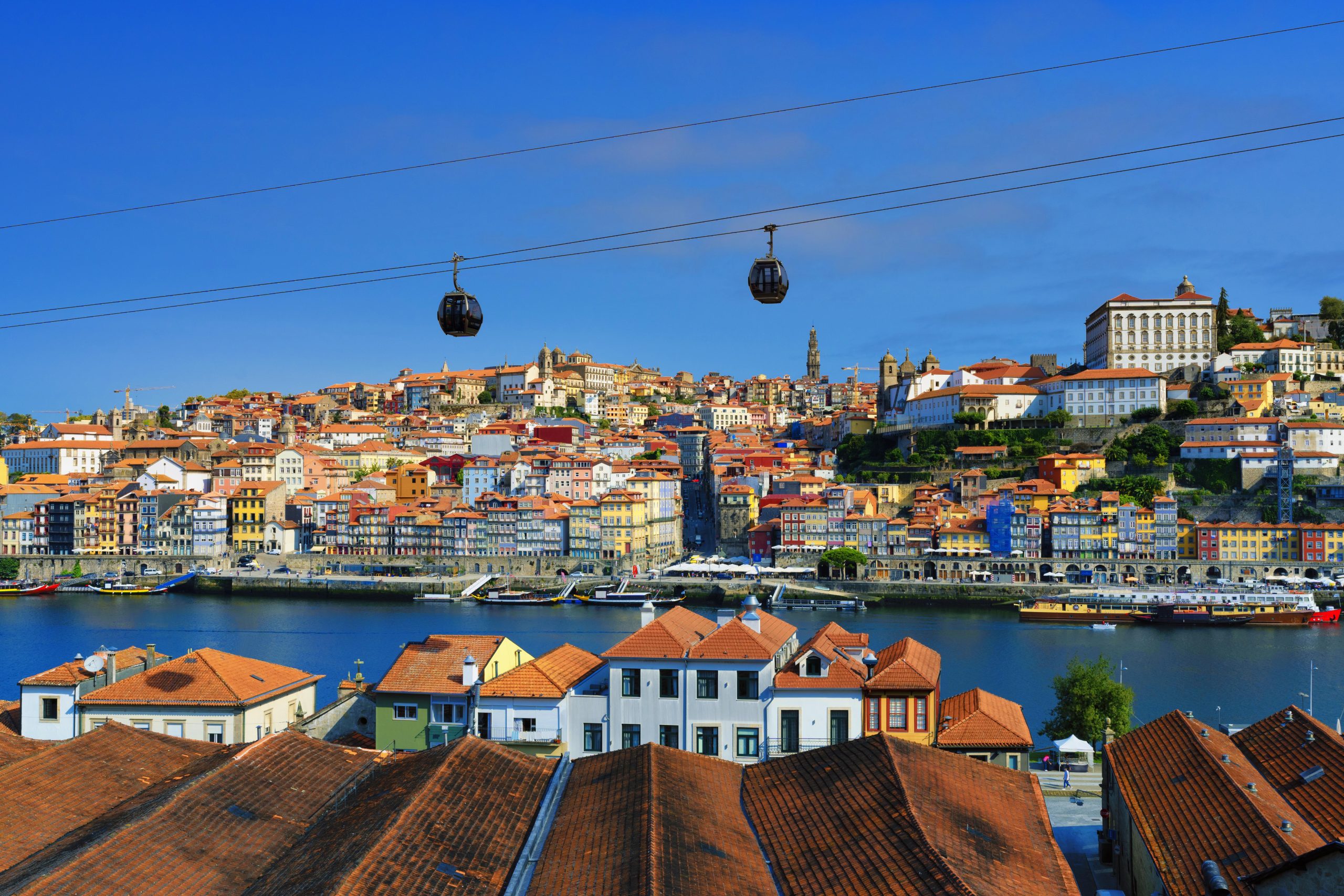Best Places to Live in Portugal: Top Cities & Regions

Looking for a lifestyle upgrade? You’re not alone. Portugal has quickly become one of Europe’s most sought-after destinations for expats, investors, retirees, and digital nomads alike. And it’s easy to see why.
The truth is that with coastlines full of sun, historic towns, and a lifestyle that has both tradition and modernity, narrowing down the best places to live in Portugal isn’t that easy, because there’s so much to love.
But before we discuss which cities and regions might be your match, let’s talk about why so many are choosing Portugal in the first place.
Why Choose Portugal as Your New Home?
Let’s not sugarcoat it, relocating to another country is a big move. But Portugal makes that decision a whole lot easier. From the moment you touch down, you feel something different here. The warmth of the people. The rhythm of daily life. The balance between affordability and quality. It’s not just about living well, it’s about living better.
Living in Portugal: The Big Picture
Portugal consistently ranks as one of the top countries for quality of life, and it’s no surprise why. You’ve got over 300 days of sunshine a year in many parts of the country. The food is fresh, simple, and delicious. Crime rates are low. Healthcare is modern and accessible. And life moves at a pace that lets you actually enjoy it.
For many, expat life in Portugal feels like a breath of fresh air, both literally and figuratively. You’ll find international communities in nearly every major city, and locals who are genuinely welcoming to newcomers. Whether you’re walking the tiled streets of Lisbon or watching the waves roll in on the Algarve, there’s a sense of calm and connection that’s hard to come by elsewhere.
What About the Cost?
Let’s talk numbers. Compared to most Western European countries, the cost of living in Portugal is refreshingly manageable. Rent, groceries, dining out, and even private healthcare can cost significantly less than what you’d pay in the UK, Germany, or France.
Sure, Lisbon and Porto have seen some price increases in recent years, but you can still live comfortably on a modest budget, especially if you’re coming from the US or Northern Europe. Smaller Portuguese cities and inland regions offer even more value without sacrificing safety, beauty, or convenience.
The Portugal Golden Visa: A Path to Residency
If you’re looking at Portugal through the lens of immigration or investment, you’ve probably heard of the Portugal Golden Visa. It’s one of the most popular residency-by-investment programs in the world, allowing non-EU nationals to gain residency through real estate purchases, capital investments, or business development.
While the program has evolved in recent years, with some restrictions on real estate options in high-demand areas, it still offers a flexible and relatively straightforward route to live, work, and eventually gain citizenship in Portugal. And yes, it allows for family inclusion, which is a major draw for those relocating with loved ones.
Quality of Life in the Details
Portugal may be laid-back, but it doesn’t cut corners on the things that matter. Public transport is efficient and affordable. The healthcare system is both high-quality and accessible. Schools, both public and private, are well-regarded – and international options are growing. You’ll also find excellent infrastructure in terms of roads, airports, and internet connectivity, making life convenient whether you’re working remotely or running a business.
At the end of the day, Portugal offers more than just a place to live. It gives you a lifestyle that’s both elevated and grounded. Safe streets, good food, and stunning views aren’t just vacation perks, they’re part of everyday life here.
So if you’re weighing your next move, whether it’s for business, retirement, or a fresh start, Portugal deserves a spot at the top of your list. And trust us, once you experience it for yourself, you’ll understand why so many people come for a visit and never want to leave.
Top Cities to Live in Portugal
You’ve already decided Portugal is on your radar. Great choice. Now the big question is: where exactly should you land? From the sun-drenched shores of the Algarve to the cobbled streets of Porto, Portugal is packed with personality. And depending on your lifestyle, work needs, or retirement plans, certain cities will suit you better than others. So let’s break down the best places to live in Portugal, one city at a time.
Living in Lisbon: Portugal’s Cosmopolitan Capital
If you love big-city energy mixed with centuries-old charm, living in Lisbon could be your perfect match. It’s Portugal’s largest city and also the most international. Think startup hubs, rooftop bars, world-class restaurants, and trendy neighborhoods like Príncipe Real and Alfama that mix old-world beauty with a modern twist.
Lisbon is where you’ll find the widest range of jobs, cultural events, and international schools. It’s especially appealing for entrepreneurs, creatives, and digital nomads. That said, the secret is out. Lisbon’s popularity means prices have gone up in recent years, especially in central neighborhoods. If budget is a factor, you’ll want to explore the outskirts like Oeiras, Almada, or even Setúbal, which offer more space and better value.
Despite the rising costs, the city’s infrastructure, safety, and lifestyle make it one of the best places to live in Portugal. And with easy access to beaches, mountains, and flights across Europe, it’s hard to beat the convenience of this capital.
Porto: Historic Charm Meets Modern Living
Head north and you’ll hit Porto, a city that somehow feels both laid-back and ambitious at the same time. Known for its wine, riverfront views, and beautifully tiled buildings, Porto is quickly becoming a top choice for expats and investors alike.
The vibe here is a little quieter than Lisbon, but don’t mistake that for boring. Porto has a booming creative scene, Michelin-starred restaurants, and a strong local culture. It’s also more affordable. Porto living costs are noticeably lower than Lisbon’s, especially when it comes to housing and day-to-day expenses.
If you’re interested in Portugal real estate, Porto offers strong value for money, especially in up-and-coming areas like Campanhã or Bonfim. For remote workers and young families looking for a solid mix of culture, affordability, and quality of life, Porto is hard to ignore.
Cascais: Luxury Coastal Living Near Lisbon
If you want the best of both worlds, that is access to the capital and laid-back beach life, Cascais might be the answer. Just 30 minutes from Lisbon, Cascais is a coastal town with a polished edge. Think luxury villas, yacht clubs, golf courses, and a sophisticated international community.
This is one of the most affluent Portuguese cities, but it earns its price tag with an unbeatable lifestyle. Walkable streets, ocean views, and a calm, safe environment make it particularly appealing for retirees, families, and anyone looking to slow down without sacrificing quality.
The cost of living in Portugal is generally reasonable, but in Cascais, expect to pay a premium, especially for property. That said, if comfort, security, and elegance are high on your priority list, this is one of the best places to live in Portugal.
Algarve Region: Southern Portugal’s Expat Haven
Let’s talk about the Algarve. If you’ve seen Instagram shots of golden beaches, limestone cliffs, and cobbled streets under blue skies, that’s this place. The Algarve lifestyle is all about outdoor living, sunshine, and an easygoing pace that makes every day feel like a holiday.
The region is dotted with charming towns like Lagos, Tavira, Albufeira, and Vilamoura, each with its own vibe. Lagos is a favorite among digital nomads and surfers. Albufeira is more resort-heavy. Tavira has a quieter, historic feel. Vilamoura attracts golfers and luxury buyers.
With a large expat community, especially British and German residents, the Algarve offers a strong support network, international schools, and English-speaking services. Property is still reasonably priced in many areas, although the coast comes with a premium. If you’re planning to retire, work remotely, or simply want sunshine year-round, the Algarve is easily one of the best places to live in Portugal.
Madeira: Island Living in Portugal
If the idea of island life speaks to your soul, Madeira should be on your radar. It’s technically part of Portugal but feels like a world of its own. Think lush mountains, dramatic coastlines, and a spring-like climate all year long.
Funchal, the island’s capital, offers everything you need for a comfortable life: great healthcare, modern infrastructure, fast internet, and a growing expat scene. And while tourism plays a major role in the economy, there’s a growing number of remote workers choosing Madeira for its balance of nature and connectivity.
Property is more affordable than in Lisbon or the Algarve, and thanks to recent investment incentives, it’s becoming an interesting destination for Portugal real estate buyers. Plus, Madeira has its own digital nomad village initiative, which makes it a magnet for location-independent professionals.
Braga: Northern Portugal’s Cultural Center
If you’re after a lower cost of living, rich history, and access to the real Portugal—without sacrificing quality, look at Braga. Located north of Porto, this city is often overlooked, but it’s a gem in its own right.
Braga is one of the oldest Portuguese cities, yet it feels young and forward-thinking thanks to its universities and tech-friendly policies. It’s quieter and more traditional, but also incredibly liveable. Think spacious apartments for the price of a Lisbon studio, great food markets, and peaceful neighborhoods.
It’s an especially good option for families or retirees looking for affordability without cutting corners on healthcare, education, or cultural life. With easy train access to Porto and the rest of the north, Braga delivers high value at a lower cost.
Cost of Living in Portugal’s Major Cities
Let’s talk numbers. Because no matter how dreamy Portugal might look in your Instagram feed, the cost of living is what makes or breaks your long-term plans. The good news? Compared to much of Western Europe, and certainly compared to major cities in the US or UK, Portugal still offers a lot of value. But, of course, some places are more budget-friendly than others.
Here’s what you need to know before you pick your new Portuguese base.
Housing Costs Comparison
Let’s start with the biggest line item: rent. If you’re heading to Lisbon, expect to pay the most. A one-bedroom apartment in the city center can go for €1,200 to €2,000 a month, depending on the neighborhood. If you’re flexible and don’t mind being a bit outside the core (say, in places like Almada or Oeiras), you could find options closer to €900.
Porto is a more affordable alternative, with city center one-bedrooms averaging around €900 to €1,300, and even less in suburban areas. Down south, in the Algarve, prices vary wildly depending on whether you’re in a luxury resort town like Vilamoura or a quieter spot like Tavira. Generally speaking, you’re looking at around €850 to €1,500.
Cascais, the coastal jewel near Lisbon, rivals the capital in price, but makes up for it in lifestyle. Meanwhile, if you’re eyeing Madeira or Braga, you’ll be pleasantly surprised. Housing costs in these cities are typically 20–30% lower than in Lisbon, making them attractive options for budget-conscious expats who don’t want to sacrifice quality.
Daily Expenses Overview
Outside of rent, Portugal is refreshingly affordable for everyday living. Eating out? A casual meal at a local restaurant will set you back €10–€15, while a three-course dinner for two in a nice place averages around €40. You can grab a good bottle of local wine at the supermarket for under €5, and yes, it’s very drinkable.
Grocery bills are reasonable, too. If you shop local and seasonal (which you should), a weekly food shop for a couple can hover around €60–€80. Utilities for a mid-sized apartment tend to fall between €100–€150 a month, depending on the season and how much you blast the AC in summer or heat in winter.
Public transport is another win. In Lisbon or Porto, monthly passes cost between €40 and €50 and give you access to metros, buses, and trams. If you’re living in a smaller city like Braga or Funchal, you might not even need a car, but if you do drive, fuel prices are similar to the European average, around €1.70–€2.00 per liter.
Healthcare and Education Costs
Portugal has a public healthcare system (SNS) that residents can access at very low cost. Many expats also choose to supplement this with private insurance, which is surprisingly affordable. A good private plan might cost you €40–€80 per month and gives you access to private clinics, shorter wait times, and more English-speaking doctors.
And the quality? Portugal ranks high for healthcare access and efficiency, especially in major cities. Lisbon, Porto, and Coimbra have world-class hospitals and clinics.
If you’re moving with kids or thinking long-term, education costs are another key factor. Public schools are free and offer a solid education, though they’re taught in Portuguese. For families who prefer international schools, Lisbon and Cascais have plenty of options—expect to pay between €7,000 and €15,000 per year depending on the school and grade level. Porto, the Algarve, and Madeira also offer a handful of respected international programs.
All in all, while the cost of living in Portugal has gone up in recent years—especially in high-demand areas—it still delivers excellent value. Whether you’re looking to stretch your retirement, invest in property, or simply enjoy a better work-life balance, Portugal’s major cities offer options for a range of budgets. And once you’ve settled in, you’ll quickly see why so many expats call it one of the best places to live in Europe.
Best Areas for Different Lifestyles
Best Places for Retirees in Portugal
If your goal is to slow down, soak up the sunshine, and live well without burning through your savings, Portugal should be at the top of your list. For retirees, the Algarve is often the first choice, and with good reason. Towns like Lagos, Tavira, and Albufeira combine stunning coastlines with excellent infrastructure, golf courses, and a well-established expat community. Plus, English is widely spoken, and healthcare is top-tier.
But the Algarve isn’t your only option. Cascais, just outside Lisbon, offers a more upscale, slightly pricier lifestyle with all the amenities of the capital nearby. Meanwhile, quieter inland cities like Coimbra offer a mix of affordability and culture, perfect for those who want to live well without the buzz of a big city.
Top Locations for Digital Nomads
Portugal has quietly become one of Europe’s top hubs for remote workers, and not just in Lisbon. Sure, the capital is still a hotspot thanks to its buzzing coworking spaces, international vibe, and great coffee culture. But rising rents have pushed many digital nomads to explore alternatives.
Enter Porto, where you’ll find a creative energy, fast internet, and a more relaxed pace of life. Ericeira and Peniche, known for their surf scenes, are also increasingly popular, especially if you’re chasing waves between Zoom calls.
And let’s not forget Madeira, yes, the island. It’s home to the world’s first official “Digital Nomad Village” in Ponta do Sol, offering free coworking spaces and ocean views. It’s ideal for remote workers who want to stay productive while living in a literal tropical paradise.
Family-Friendly Portuguese Cities
If you’re relocating with kids, safety, education, and a strong community vibe are key. Lisbon and Porto both offer international schools and plenty of green spaces, though they can get pricey.
Smaller cities like Braga and Coimbra shine for families. They’re quieter, more affordable, and packed with cultural events, parks, and family-friendly restaurants. Braga, in particular, is known for being one of the youngest cities in Portugal demographically, which gives it a lively, inclusive feel without the chaos of a major metro.
The Algarve also deserves a mention. Towns like Faro or Loulé strike a nice balance between calm living and solid schooling options, plus, your kids will grow up speaking Portuguese and swimming year-round. Not a bad deal.
Best Beach Towns in Portugal
Portugal’s coast is long, wild, and full of gems. If you’re all about salty air, sunset strolls, and oceanfront living, you’re spoiled for choice.
Ericeira is a standout, charming, close to Lisbon, and the first World Surfing Reserve in Europe. It’s laid-back but still full of life.
Down in the Algarve, you’ve got dreamy towns like Lagos, Carvoeiro, and Alvor, offering cliffs, caves, and golden beaches. These spots mix local culture with a solid expat scene and year-round sunshine.
Don’t overlook Nazaré either, home to the world’s biggest waves, yes, but also a peaceful coastal town with traditional vibes and plenty of character.
Practical Guide to Moving to Portugal
So, you’ve got your eyes on Portugal. Great choice. But before packing your bags and booking that one-way ticket, let’s walk through the essentials of making your move smooth and stress-free.
Visa requirements
Unless you hold an EU passport, you’ll need a visa to stay in Portugal long-term. The most popular option for expats and remote workers is the D7 visa, which is geared toward those with passive income or remote employment. It’s relatively straightforward if you meet the income threshold and have a clean background. Then there’s the Golden Visa, designed for investors who meet specific criteria, usually through real estate or capital investment. Once you’ve lived in Portugal for five years, you may be eligible to apply for permanent residency or even citizenship.
Property purchase process
Buying property in Portugal is surprisingly accessible for foreigners. There are no major restrictions, and the legal process is well regulated. That said, working with a trusted real estate agent and lawyer is highly recommended. You’ll need a Portuguese tax number, a local bank account, and funds set aside for taxes and fees, which can add around seven to eight percent on top of the purchase price. Take your time, do your due diligence, and don’t rush. The right home is worth waiting for.
Healthcare system
Portugal’s healthcare system is a big draw for expats. It’s public, affordable, and high quality. Residents have access to the Serviço Nacional de Saúde, and many also opt for private insurance for quicker access and more flexibility. Even the private sector is reasonably priced compared to most other Western countries. If healthcare is high on your priority list, Portugal checks the box.
Transportation infrastructure
Getting around in Portugal is refreshingly easy. In cities like Lisbon and Porto, public transport is reliable, clean, and cheap. Trains and buses connect most regions, and for those wanting to explore the countryside or smaller towns, renting or owning a car gives you full freedom. Roads are in great condition, and driving is pretty straightforward, though parking in the cities can be tricky. If you’re flying in and out often, Lisbon and Porto both have solid international airports with frequent connections across Europe and beyond.
Tips for Choosing Your Ideal Portuguese Location
Portugal might be small, but every corner of it offers a different lifestyle. Finding your perfect spot is all about aligning your needs with what each region delivers.
- Climate considerations: Love sunshine year-round? Head south to the Algarve. Prefer four seasons and a bit of misty charm? Northern cities like Porto or Braga will be more your vibe. Lisbon sits somewhere in between, offering a Mediterranean climate with mild winters and warm summers. If weather affects your mood, your productivity, or your outdoor lifestyle, take climate seriously when deciding where to live.
- Expat communities: Some places in Portugal are expat magnets. Lisbon and the Algarve, in particular, have thriving international communities, with meetups, co-working spaces, and social clubs. If you’re looking for immediate connection and support, these areas will feel like home quicker. On the flip side, smaller towns may offer deeper integration with local culture but can feel isolating at first. Think about how much social interaction you want and where you’ll feel most supported.
- Language barriers: Yes, English is widely spoken in tourist-heavy spots, but you’ll get so much more out of your experience if you learn even basic Portuguese. In smaller towns or when dealing with bureaucracy, some Portuguese will go a long way. Many expats take classes or use language exchange meetups to improve, and locals really appreciate the effort.
- Local amenities: Last but definitely not least, look at what your day-to-day will actually feel like. Do you need a gym nearby? Are you a foodie who needs great restaurants? Do your kids need international schooling options? Make a checklist and see which cities or towns meet your non-negotiables. It’s easy to fall in love with the idea of a place, but your real-life rhythm should match up too.
Need Help?
Your goals deserve a strategy that matches your ambition. At Millionaire Migrant, we’ve spent decades helping individuals and families achieve freedom through tailored investment plans, strategic tax optimization, and second citizenship solutions. Our mission is simple: we help you create a life where you can live, work, and invest with no borders and minimal tax burdens. Ready to redefine your future?
Contact us today and discover how Millionaire Migrant can help you make it happen.


